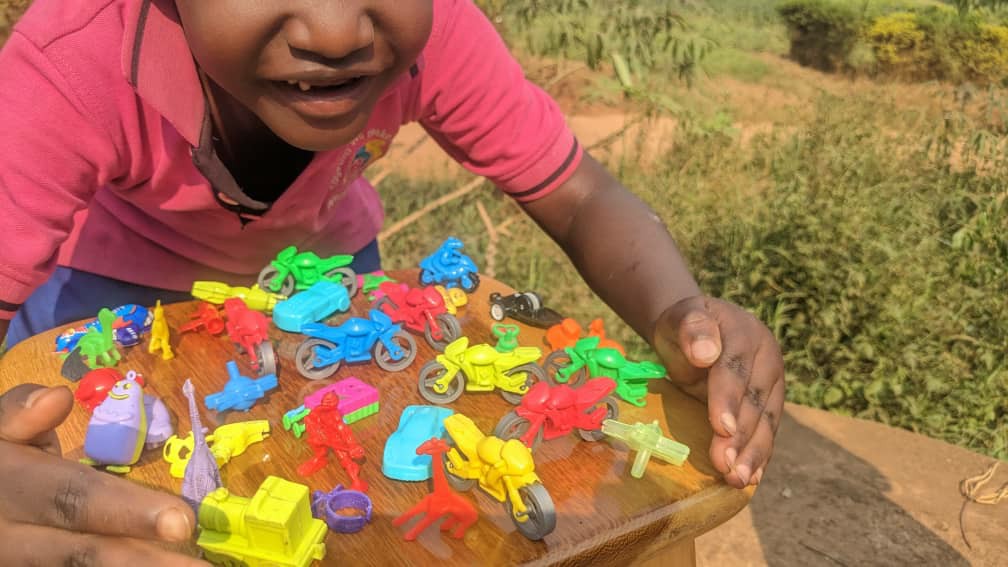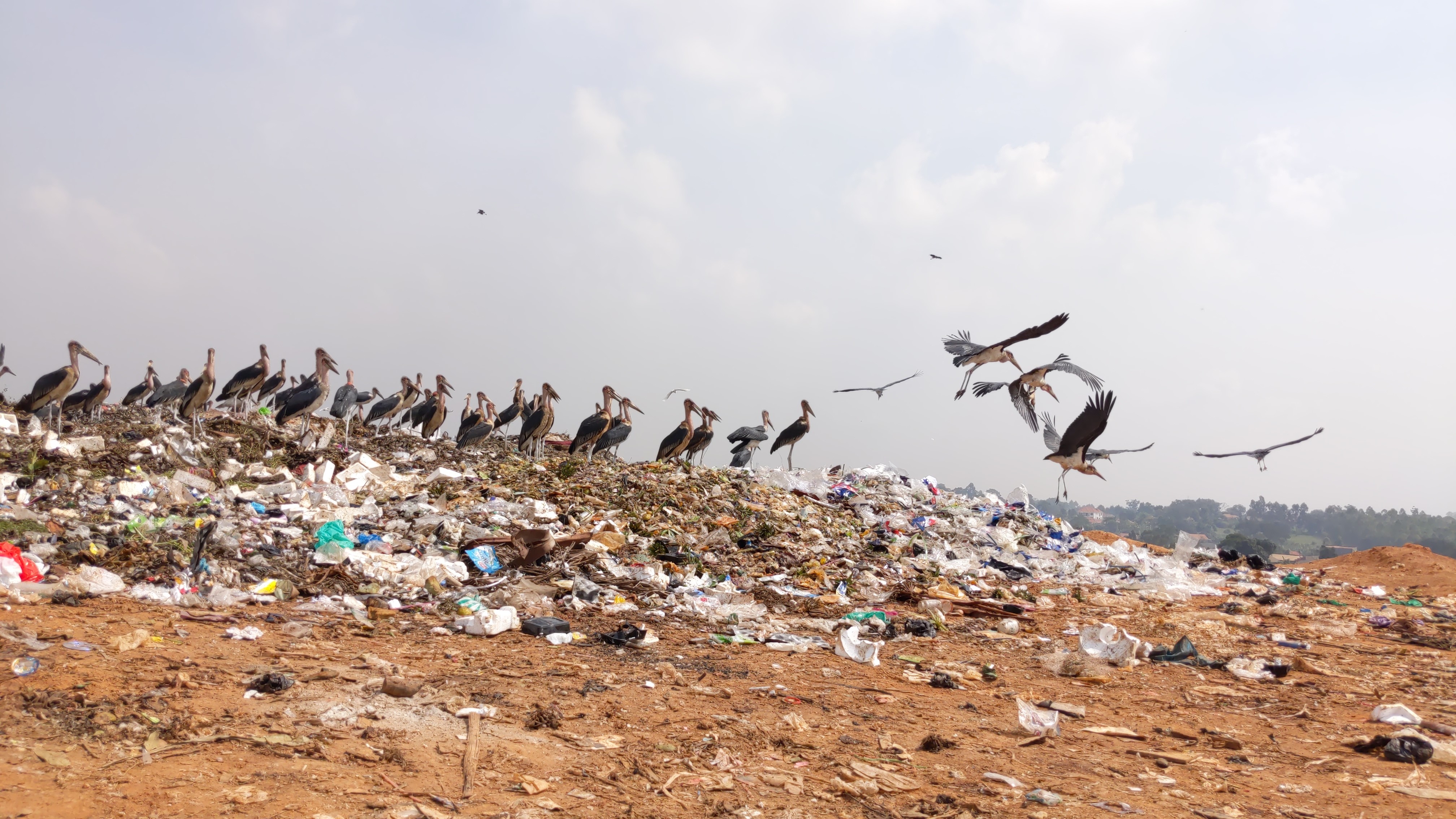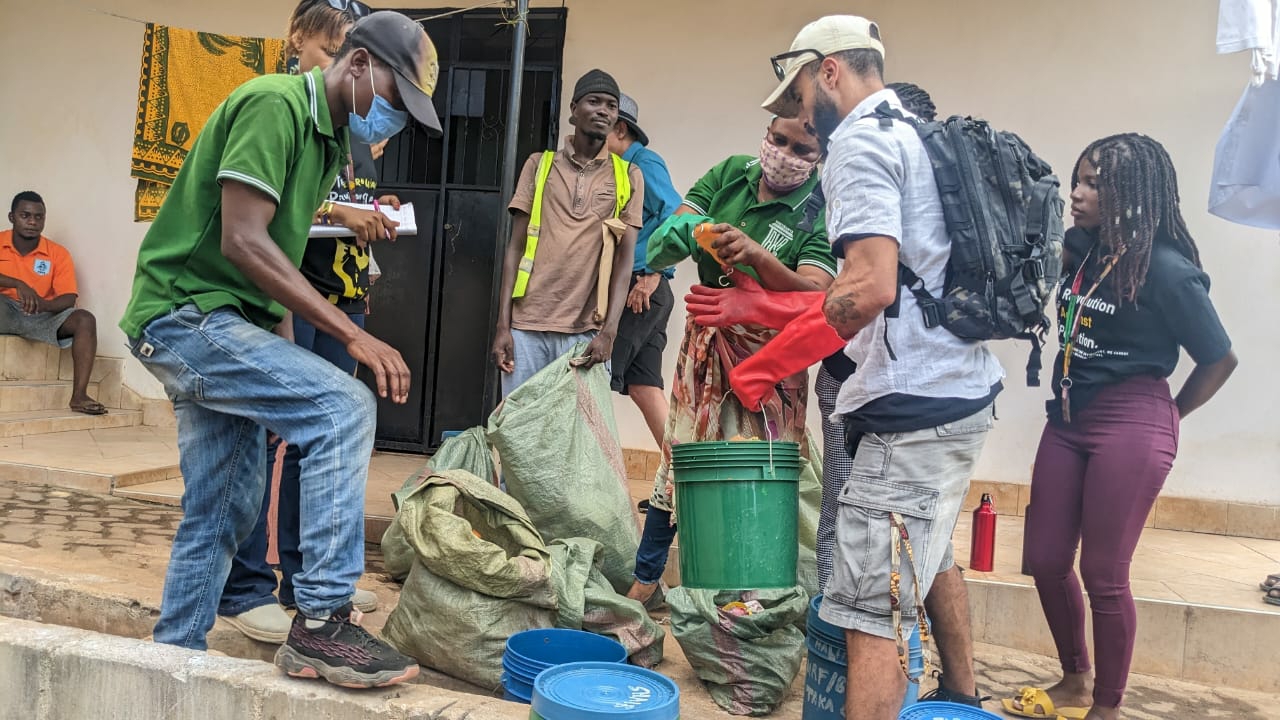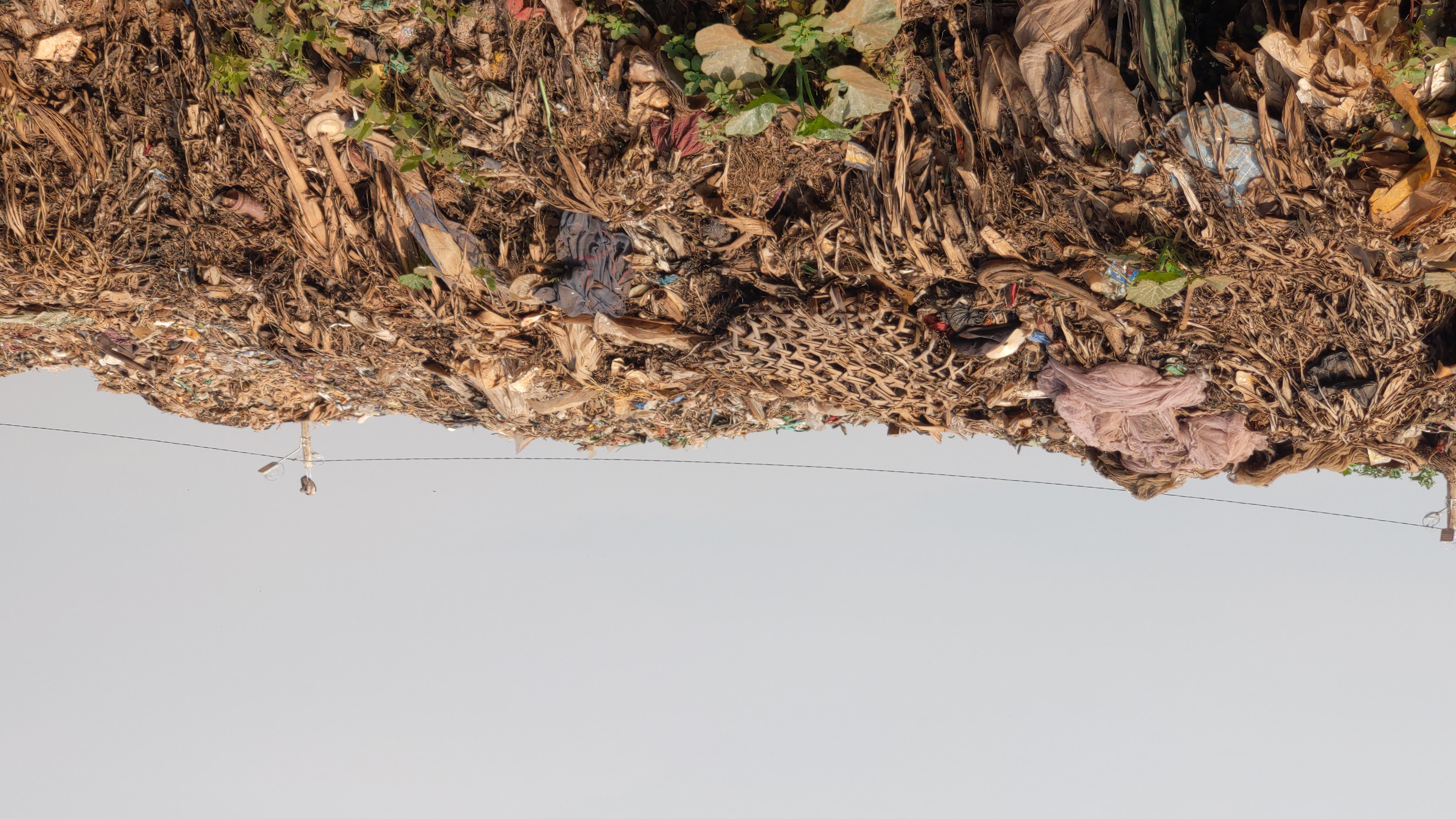What are the challenges faced by waste pickers
What are the opportunities in empowering waste pickers
In Kampala City, over 1500 tons of plastic waste are generated daily but only 500 tons are collected. This represents 30% collection leaving 70% uncollected. Plastic waste is the biggest public health challenge in Kampala with plastics clogging in drainage channels. Plastic waste from the city also is finding its way into Lake Victoria through the Nakivubo Channel.
Uganda is facing an increase in the production of single-use plastics with more “cheaper” products on single-se plastics with more “cheaper” products on market. Multinationals like Pepsi and local bottling companies like Yaket and Kiri Bottling are now making “cheap” bottled water sold at 0.14 USD an equivalent of 500 UGX. These have managed to penetrate and reach even the most remote places in Uganda (villages / rural communities). Companies like Coca-Cola are making plastics to a tune of 4,000,000 million single-use plastic bottles per week. The company has invested 15 million dollars in expanding its production plant in Namanve Industrial Park.
In 2021 a brand audit conducted by End Plastic Pollution in partnership with Break Free From Plastic exposed Coca-Cola as Uganda's top plastic polluter.
Uganda Brand Audit Report https://www.breakfreefromplastic.org/bffp_reports/uganda-brand-audit-report/
Waste Pickers in Kampala City have proved to be an effective solution to Uganda' s plastic problem. However despite there societal, environmental and economic role, waste pickers are exposed to several challenges including; Unhealthy working conditions, little pay, Social stigmas, Exploitation from middle-men and corporate polluters, Weak Laws, Abuse from authorities among others.
This International Waste Pickers Day together with GAIA (Global Alliance for Incinerator Initiatives) we are highlighting the challenges faced by waste pickers and opportunities of empowering waste pickers in Uganda.
Challenges faced by waste pickers in Uganda.
Little pay.
Waste pickers in Uganda are paid very little which can not afford them any basic needs. Such dynamics within the waste value chain have put waste pickers in a disadvantaged position.
According to Abdalla Kamulegeya a waste picker around Kampala International University in Kansanga. Most of the plastic scrap material collected in Kampala is taken to Namanve Industrial Area, Jinja city or bought off by a few recyclers within Kampala.
A the the Katwe Railway Plastics scrap Market in Kampala City.
PET bottles are bought at UGX 350 per kilogram ( 0.097 USD ), Other plastic items, like used jerry cans, tables, basins, buckets at 1000 per kilogram ( 0.278 USD), Paper boxes are sold at UGX 400 per kilogram ( 0.111 USD). Used white paper is at UGX 1000 per kilogram ( 0.278 USD).
Plastic bags (soft) UGX 1000 per kilogram ( 0.278 USD), Plastic bags (hard) UGX 300 ( 0.083 USD), Plastic bags (black shopping bags) at UGX 100 per kilogram ( 0.0278 USD ).
Kamulegeya further notes that the plastic labels on plastic bottles are unnecessary.
They are always removed and thrown away for they have no use.
Unhealthy working conditions.
Waste pickers have no working tools to help them collect or store plastics. They work with bare feet and hands with no personal protective equipment which exposes them to cuts and injuries while collecting plastics putting their lives at risk. With these working poor working conditions waste pickers have been exposed to contracting diseases associated with poor sanitation and disposal of material.
Through the Plastic-free campus program at Kampala International University, waste pickers have benefited with metallic waste collection units to help them collect plastics from vendors, supermarkets and grocery shops around the campus in Kansanga.
Read more about our Plastic-free Campus program launched in 2021 by End Plastic Pollution and Break Free From Plastic in partnership with Kampala International University.
Social stigmas.
Waste pickers are looked down, stigmatized as being uneducated, homeless and unaware of the values of plastic.
This demotivates them to continue doing their work.
Exploitation from middle-men and corporate plastic polluters.
Despite companies like Coca-Cola promising to collect every plastic bottle they sell out. The implementation strategy of this move under the company's World Without Waste initiative does not recognize the role of waste pickers in achieving this yet they (waste pickers) are the ones collecting this plastic.
The fact that Coca-Cola dictates what amount of plastics one has to collect in order to be eligible to sell to it is already unfair to poor waste pickers who do have such capacity.
The Company also has set the price at which it buys the plastic waste, however this price has been able to be manipulated and at times remains undisclosed to waste pickers so as to favor the middle-men.
Kiku John a waste picker and plastic scrap trader at Katwe says that, Coca-Cola requires one to collect one ton of plastic in for one to sell to it, however individual waste pickers cannot collect or store such huge amounts of plastic.
2. Coca-Cola buys a kilogram at 1000 UGX ( 0.278 USD), however waste pickers are paid as little as UGX 350 ( 0.097 USD ) by middle men.
All these process have only favored rich middlemen and are unfair to the entire waste pickers community.
Weak laws.
The Uganda environment law does not recognize waste pickers recognize of the waste pickers sector. However despite this gap, the law goes further to allow companies to contract "others" to collect waste on their behalf.
Another example is the municipal waste management system in Uganda at local government level. It is clear that waste pickers are responsible for the uncollected 70% of the plastic waste in Kampala City. Therefore they need to be empowered through incorporation within the wider city waste management scheme.
Abuse from authorities.
From city officials to local leaders at community level and security officials at landfills. Apart from labeling waste pickers as criminals they prevent waste pickers from accessing certain materials.
https://no-burn.org/strengthening-waste-picker-organising-in-africa
Opportunities of empowering waste pickers.
Uganda has an opportunity to grow a zero-waste economy.
This model is opposed to the destructive linear (Produce -Use - Dispose) model. With a zero-waste model, consumption of all resources is by means of responsible production, packaging, reuse and recovery without burning and with no discharges to land, water and air threatening the environment and human health.
Waste pickers can enable build plastic-free communities.
To ensure that we end plastic pollution we must promote collective community action aimed at increasing recollection. Communities working with waste pickers stand high chances of avoiding small dumping sites to develop. Mustafa Ssemanda a Waste Picker from Nsambya Kibuli, at Kibuba Mutwe duping site says that "if people worked with his group they can be collecting the waste from their homes instead of dumping. People are suffering, the dump site is growing everyday and it is extending the garbage into their houses. The dump site cleared all the pasture and now goats and cows around here have to eat at the dumping site."
Unlocking the benefits of circularity.
For Uganda to get on a sustainable path way, it has to understand the applicability and benefits of new sustainable business models like the circular economic model.
Waste pickers are increasing the rate of recycling by re-entering waste into the economy for reuse and repurposing.
Help to extend the lifespan of landfills by diverting (recyclable) material away.
Waste pickers collect and store materials instead of them going to landfill. The amount of waste at some landfills in Kampala like Kiteezi is alarming. The site is now twice as tall as a 6 stored building, the rate of waste reduction at the landfills through giving access to waste pickers is lower that the rate at which waste is being dumped at landfills.
For smaller landfills forming up around the city like Nsambya - Kibuli at Kikuba Mutwe nearer residential places it is the issue of mixing waste making difficult for waste pickers to collect.
According to The Global Alliance of Waste Pickers and organization raising awareness for Waste Pickers in over 28 countries. Communities where waste segregation is not part of the culture make it difficult for waste pickers to sort and collect (recyclable) material.
Recycling without waste pickers makes much of the plastic waste generated to become garbage.
Job creation for youth.
Waste picking has potential to create jobs and help unemployed youth earn an income.
https://no-burn.org/strengthening-waste-picker-organising-in-africa
International Waste Pickers Day 2022 - Contributors.
Abdalla Kamulegeya - Waste Picker - Makindye Kansanga at Kampala International University.
Mustafa Ssemanda - Waste Picker - Nsambya Kibuli, at Kibuba Mutwe duping site.
Kiku John - Waste Picker - Katwe Railway Plastics Scrap Market.
Wanda Moses - End Plastic Pollution
Gwokyalya Joyce - End Plastic Pollution
Nirere Sadrach - End Plastic Pollution
Mwanja Kiiza Joseph - End Plastic Pollution / Kampala International University.




